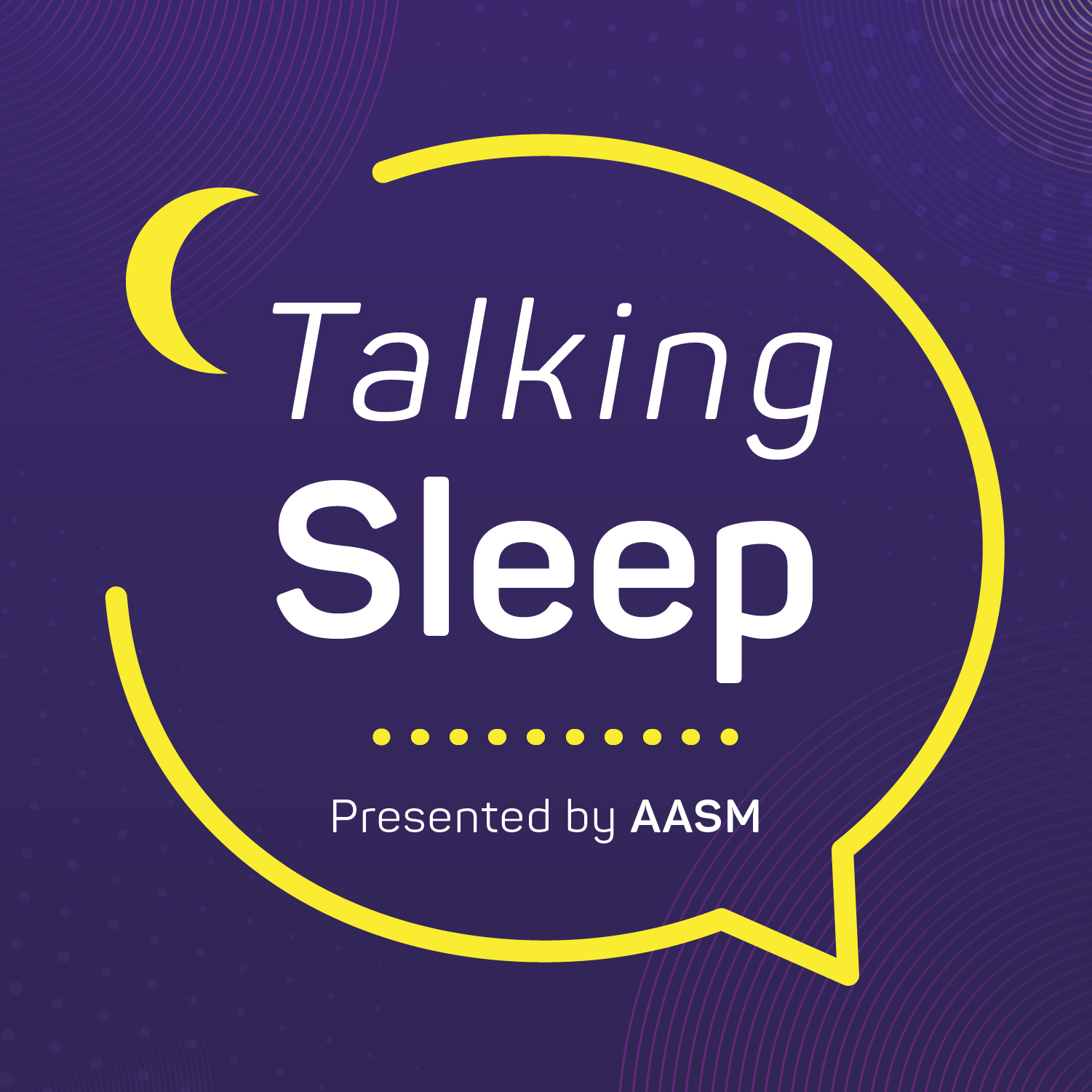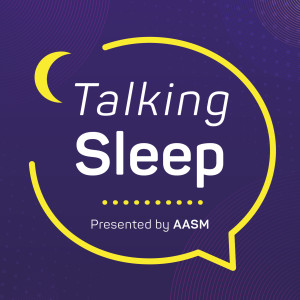
484.5K
Downloads
131
Episodes
The vast field of sleep medicine is always evolving. Listen to Talking Sleep, a podcast of the American Academy of Sleep Medicine (AASM), to keep up on the latest developments in clinical sleep medicine and sleep disorders. Our host, Dr. Seema Khosla, medical director of the North Dakota Center for Sleep in Fargo, will take an in-depth look at issues impacting the diagnosis and treatment of sleep disorders. Episodes will feature conversations with clinicians, researchers, sleep team members and other health care experts working to help us sleep well so we can live well.
The vast field of sleep medicine is always evolving. Listen to Talking Sleep, a podcast of the American Academy of Sleep Medicine (AASM), to keep up on the latest developments in clinical sleep medicine and sleep disorders. Our host, Dr. Seema Khosla, medical director of the North Dakota Center for Sleep in Fargo, will take an in-depth look at issues impacting the diagnosis and treatment of sleep disorders. Episodes will feature conversations with clinicians, researchers, sleep team members and other health care experts working to help us sleep well so we can live well.
Episodes

Friday Nov 28, 2025
Live from Disruptors: New Paths in Sleep Medicine
Friday Nov 28, 2025
Friday Nov 28, 2025
In this special live episode recorded at Sleep Medicine Disruptors in Austin, Texas, host Dr. Seema Khosla sits down with two standout innovators whose technologies captured the spirit of disruptive innovation in sleep medicine. Dr. Jason McKeown from Neurovalens and Dr. Onur Kilic from Bairitone Health present groundbreaking approaches to treating insomnia and personalizing obstructive sleep apnea therapy.
Dr. McKeown, a neurologist, introduces his FDA-cleared non-pharmacological treatment for insomnia using vestibular nerve stimulation. He explains how the technology works, why stimulating nerves in this manner is safe, and how it differs from vagus nerve devices. The conversation explores the relationship with cognitive behavioral therapy for insomnia (CBT-I), addresses the placebo effect question, and clarifies whether this is a long-term solution or temporary intervention. Dr. McKeown discusses contraindications including pregnancy and Inspire therapy, potential side effects, and ideal patient populations.
Dr. Kilic presents his sensor technology that enables non-invasive assessment of airway collapse location and severity—what he calls an "anatomic PSG." This innovation addresses a critical challenge: predicting which patients will respond to specific treatments like oral appliances, Inspire, or PAP therapy based on individual anatomical collapse patterns. Using a cheek-mounted sensor, the device identifies obstruction levels, differentiates between primary and secondary collapse sites, and detects collapse at the velopharyngeal level.
The discussion explores whether this represents a scalable alternative to drug-induced sleep endoscopy (DISE), how it integrates with OSA endotyping, and practical applications during titration studies to identify optimal pressure ranges and guide combination therapies. Both innovators emphasize moving beyond one-size-fits-all approaches toward personalized, anatomy-based treatment selection.
Whether you're interested in non-pharmacological insomnia treatments, precision medicine approaches to OSA, or the future of sleep diagnostics, this episode showcases innovative thinking driving the next generation of sleep medicine.
Join us for this exciting live conversation from Sleep Medicine Disruptors.

Friday Nov 14, 2025
Craniofacial Sleep Medicine
Friday Nov 14, 2025
Friday Nov 14, 2025
In this episode of Talking Sleep, host Dr. Seema Khosla welcomes Dr. Dave Singh, a former Adjunct Professor in Sleep Medicine at Stanford University, with a PhD in craniofacial cleft palate development, and a third PhD in orthodontics, to explore the evolving field of craniofacial sleep medicine. As founder of REMA Sleep based in North Carolina, Dr. Singh introduces the concept of craniofacial sleep medicine—an etiology-based approach to treating obstructive sleep apnea guided by anthropomorphic features rather than solely AHI severity metrics.
Craniofacial sleep medicine represents a paradigm shift from license-based treatment allocation to collaborative, anatomy-driven care where dentists, surgeons, and sleep physicians work together to determine the most appropriate interventions based on individual structural characteristics. Dr. Singh explains why understanding craniofacial structures is crucial for personalizing OSA treatment, including why Asian populations show high OSA prevalence despite lower obesity rates.
The conversation provides a comprehensive crash course in assessing craniofacial anatomy: What is retrognathia and what causes it? How can clinicians alter jaw position by adjusting cranial base morphology? Dr. Singh explains the classification system for dental occlusion (Class I, II, and III bites), midface assessment techniques, and the palate evaluation method Dr. Guilleminault taught fellows. He discusses critical anatomical considerations including tongue positioning at rest and during sleep, lateral pharyngeal wall collapse, and cervical vertebrae influence on airway patency.
The episode explores both preventive approaches in children and interventions for adults, addressing whether craniofacial modifications require surgery or can be achieved through other means. Dr. Singh discusses palatal expansion, tongue traction techniques, and the physiological components that remain addressable even after skeletal maturity. He also explains age-related changes including loss of muscle tone, bone volume reduction, and maxillary drift that progressively narrow the airway.
Intriguing topics include the mechanisms behind why didgeridoo playing and conch shell blowing improve sleep apnea, the role of oromyofunctional therapy as a viable treatment option, evolutionary changes in human dentition that impact airway anatomy, and even the dental stem cell implications for regenerative approaches. Dr. Singh also clarifies surprising facts, such as why mouthguards in contact sports serve purposes beyond tooth protection.
Whether you're seeking to understand anatomical contributors to OSA beyond obesity, interested in multidisciplinary treatment approaches, or curious about how craniofacial structure influences treatment selection, this episode provides essential insights into personalized, anatomy-based sleep apnea management.
Join us for this fascinating exploration of how form determines function in the upper airway and how understanding craniofacial anatomy can revolutionize OSA treatment strategies.

Friday Oct 31, 2025
Responsible AI Use in Sleep Medicine
Friday Oct 31, 2025
Friday Oct 31, 2025
In this episode of Talking Sleep, host Dr. Seema Khosla welcomes members of the AASM Artificial Intelligence in Sleep Medicine Committee—Dr. Margarita Oks, Dr. Subaila Zia, Dr. Ramesh Sachdeva, and Matt Anastasi—to discuss their recently published position statement on the responsible use of AI in sleep medicine practices.
Artificial intelligence is rapidly transforming healthcare, from AI-assisted sleep study scoring to clinical documentation tools and insurance claim processing. Yet AI is not a monolith—the technology encompasses various types with different capabilities, risks, and regulatory considerations. Matt Anastasi breaks down the different forms of AI clinicians encounter in practice, while the panel explains what "responsible use" actually means in practical terms.
The updated position statement, notably shorter and more accessible than previous versions, addresses four major pillars: data privacy, fairness and transparency, infrastructure requirements, and medical-legal considerations. The discussion explores critical questions facing sleep medicine practitioners: How do we understand and trust the AI systems we use? What happens when insurance payors deploy AI to deny claims—should we fight AI-generated denials with AI-generated appeals? Do patients need to be informed when AI is used in their care, and how specific must those disclosures be?
The conversation delves into liability concerns that keep practitioners awake at night: If your employer implements AI and it makes an error, who bears responsibility? What about ignoring AI prompts—does that create liability? Dr. Sachdeva explains the concept of vicarious responsibility and how it applies to AI implementation.
Practical implementation guidance is provided through discussion of governance checklists, equity considerations in AI deployment, and the limitations of FDA clearance for AI-assisted sleep study scoring. The experts introduce AASM Link and discuss how practitioners can evaluate AI tools beyond marketing claims, ensuring systems are trained on diverse, representative data sets.
The episode tackles a fundamental question: Is AI use inevitable in sleep medicine, or can practitioners opt out? The panel offers realistic perspectives on integrating AI responsibly while maintaining clinical judgment and patient-centered care.
Whether you're already using AI tools, considering implementation, or resistant to adoption, this episode provides essential guidance on navigating the AI transformation in sleep medicine while upholding professional and ethical standards.
Join us for this timely discussion about balancing innovation with responsibility in the AI era of sleep medicine.

Friday Oct 17, 2025
PLATO: New Longitudinal Assessment Tool for Sleep Apnea
Friday Oct 17, 2025
Friday Oct 17, 2025
In this episode of Talking Sleep, host Dr. Seema Khosla welcomes Dr. Doug Kirsch, Medical Director of Atrium Health Sleep Medicine and Clinical Professor in the Department of Neurology at Wake Forest School of Medicine, and Dr. Fariha Abbasi-Feinberg, president-elect of the AASM and private practice physician with Millennium Physician Group in Fort Myers, Florida, to introduce PLATO—a groundbreaking longitudinal assessment tool for obstructive sleep apnea.
The Epworth Sleepiness Scale has been a cornerstone of sleep medicine practice for decades, yet clinicians universally acknowledge its limitations in capturing the full patient experience. Similarly, PAP adherence—while important and part of Medicare's MIPS program—tells only part of the story about treatment success. During his AASM presidency, Dr. Kirsch recognized the need for a more comprehensive metric and convened an expert advisory panel to develop a better solution.
The conversation traces PLATO's development journey, which Dr. Rosen described as "Doug's baby with a prolonged gestation." Starting with 44 potential questions and utilizing the ICON methodology, the panel carefully refined the tool to capture domains beyond simple sleepiness—including quality of life, functional impairment, and symptom burden that the Epworth overlooks. Dr. Kirsch and Dr. Abbasi-Feinberg explain the validation process, how the tool discriminates between OSA severity levels, and why certain seemingly similar questions about sleepiness were all retained.
The episode addresses practical implementation questions: How is PLATO scored? Why do the first two sections use 5-point scales while the final section uses 10 points? Is it free to use, and how does one access it? Will it integrate into electronic health record systems like Epic? Most importantly, how should clinicians use this tool—will it replace the Epworth for Medicare requirements, or does it serve a different purpose?
The discussion also explores how PLATO relates to the recent AHRQ report on OSA treatment outcomes and why the tool focuses on patient-reported symptoms rather than solely cardiovascular endpoints. Dr. Kirsch shares his vision for PLATO's future, including hopes for foundation grants to further study the tool and demonstrate that treating OSA and its associated sleepiness meaningfully improves patient outcomes.
Whether you're frustrated with current assessment limitations, interested in value-based care metrics, or seeking better ways to document treatment efficacy beyond adherence data, this episode provides essential insights into a tool that may reshape how we measure success in sleep medicine.
Join us for this important discussion about moving beyond PAP adherence and Epworth scores to truly capture what matters to our patients.
